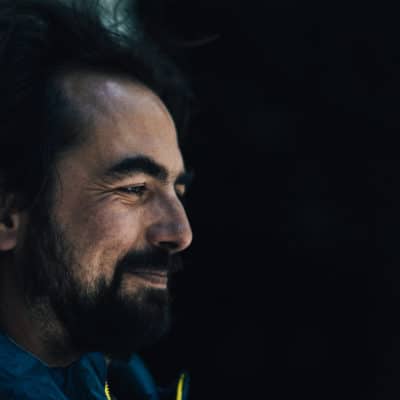 “A Fine Line” is a long-awaited gift to the bouldering community. This surprising new cinematic offering by Josh Fowler and Andrew Kornylak breathes vital life into the sport of bouldering, so greatly deflated, it seems, by the trending spate of online bullshit that has actually found its way onto the rocks themselves. No other bouldering movie that I’ve seen so successfully captures the sport as I not only see and experience it on my own miniature scale, but also believe, however dubiously, it to exist on some ideal level. Here the tireless, frustrating, joyful, and above all completely nugatory pursuit that is bouldering fully blooms.
“A Fine Line” is a long-awaited gift to the bouldering community. This surprising new cinematic offering by Josh Fowler and Andrew Kornylak breathes vital life into the sport of bouldering, so greatly deflated, it seems, by the trending spate of online bullshit that has actually found its way onto the rocks themselves. No other bouldering movie that I’ve seen so successfully captures the sport as I not only see and experience it on my own miniature scale, but also believe, however dubiously, it to exist on some ideal level. Here the tireless, frustrating, joyful, and above all completely nugatory pursuit that is bouldering fully blooms.
The storyline follows two faces unfamiliar to the proverbial “big screen”—the Southeastern climbers Brion Voges and Jimmy Webb—as they circle from their home in Chattanooga to as high as the Colorado alpine and as far north as Castle Rock, Idaho, on a search for good pebble wrestling.
No doubt adding to the movie are the interviews with the characters. Jimmy Webb is extremely well spoken, bright and just a natural on film. Brion Voges is genuine; his eyes literally spark in the moments when he describes a particular climbing project. I thoroughly enjoyed getting to know these two personalities through this movie, thought they came off really well, and was inspired by their climbing prowess. Even Peter Beal—whose blog I generally find to be a collection of some of the more pompous purple prose in climbing’s online world—adds a lot to “A Fine Line” in the form of contextualizing and articulating the artistic pursuit of modern-day bouldering. In fact, Beal, as much as Webb and Voges, won me over. This film would’ve been far shallower without his voice and depth of experience—particularly his analogy of approaching alpine bouldering the way a mountaineer might approach Everest: one step at a time. Breath. Slow Down. This moment really resonated within me as something new and illuminating to my own bouldering experience, and I feel thankful about that.
Jimmy Webb and Brion Voges’s search, however, is far more nuanced than simply looking for sick rocks, and here is where “A Fine Line” departs from most other bouldering videos, which often, intentionally or not, reduce bouldering to a posed theater in which boulder problems are made into something more than what they are, and climbers exploit their two minutes on film by trying to look cool.
“A Fine Line” throws away, dismisses, and just pisses on the plot to which most climbing movies subscribe—that of the “dragon slayer,” in which a climber finds one big magnificent project, is challenged by it, and eventually slays the beast. That’s a perfectly fine storyline, and when it’s done right, it’s extremely compelling, but the problem is that most of the time, we aren’t slaying dragons—more like shooting deer in a zoo. The longer I climb, the more I realize that dragons—those big, life-altering projects—only come along once in awhile and only if we’re lucky. Filmmakers get into trouble when, needing a plot, they dramatize the route and climber in order to mesh with this conceit. The more it’s done, the more cynical viewers become because we begin to see all climbs and climbers on films as at least partially disingenuous.
The proof, for me, that “A Fine Line” is such a successful departure from this trope is the entire lack of grades throughout the movie. No problems are given grades—in fact, they are scarcely even given names. The fact that I didn’t even notice this until halfway through the film blew my mind because, usually, this omission is extremely bothersome to me as a viewer (and editor). We all know that grades aren’t the most important part of the climbing experience, but they are still important. Especially for vicarious viewers of media, who can’t touch the rock but can at least come closer to it by knowing whether something is V2 or V12. That information, as fraught as it may be, inevitably informs an understanding of what one is seeing.
Other climbing films have tried to showcase bouldering as the soulful pursuit that we all know it to be—and they often try to do it by simply not mentioning what something is graded. The result is often the opposite of what’s intended because the omission is such a glaring elephant in the room—you think about grades even more because you wonder. Capturing bouldering’s elusive, slippery soul—on film, paper or otherwise—isn’t simply a matter of showing a rad-looking problem and omitting its grade. The entire composition must plunge further and deeper, and this is exactly what “A Fine Line” does.
The film isn’t just about Webb and Voges’ search to find hard boulder problems; the film is about the search itself, and I think therein is the difference.
Congrats on Andrew Kornylak and Josh Fowler on doing something different, and doing it successfully. This film got me really, really, really psyched to go bouldering.


Hey have you seen my super sick movie from Red Rox? Cuz if you haven’t you could buy it and get super psyched and see me climb. Im famous ya know. Hehe. My favorite part of this movie was when Daniel fell. Hehe. He is like sponsores and totally biffed it. Hehe. I swear that Red Rox is like. The new Hueco.